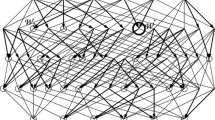Abstract
We consider the problem of strategic manipulation for decision schemes that provide an adequate representation (in some sense) of the distribution of power within a committee. “Strategy-proof representation” is very restrictive: it implies that the committee contains exactly one minimal winning coalition. So we introduce the weaker concept of “Ordinally Bayesian Incentive Compatible representation” and prove the existence of such representations for weak games under some conditions. Finally, constructing examples, we show first how necessary these conditions are—including the use of chance in the voting procedure — and second that we cannot avoid Condorcet's paradox.
Similar content being viewed by others
References
d'Aspremont C, Gérard-Varet L-A (1979) Incentives and incomplete information. J Publ Econ 11: 25–45
d'Aspremont C, Gérard-Varet L-A (1982) Bayesian incentive compatible beliefs. J Math Econ 10: 83–103
Barbera S (1979) Majority and positional voting in a probabilistic framework. Rev Econ Stud 46: 379–389
Dasgupta P, Hammond P, Maskin E (1979) The implementation of social choice rules: some general results on incentive compatibility. Rev Econ Stud 46: 185–216
Gibbard A (1977) Manipulation of schemes that mix voting with chance. Econometrica 45: 665–681
Hanoch G, Levy H (1969) The efficiency analysis of choices involving risk. Rev Econ Stud 36: 335–346
Harsanyi JC (1967–68) Games with incomplete information played by ‘Bayesian’ players, parts I–III. Manag Sci 14: 158–182; 320–334; 486–502
Holzman R (1986) On strong representations of games by social choice functions. J Math Econ 15: 39–57
Hylland A (1980) Strategy proofness of voting procedures with lotteries as outcomes and infinite sets of strategies. University of Oslo, Institute of Economics
Mertens J-F, Zamir S (1985) Formulation of Bayesian analysis for games with incomplete information. Int J Game Theory 14: 1–29
Myerson RB (1985) Bayesian equilibrium and incentive-compatibility: an introduction. In: Social goals and social organization. Essays in memory of Elisha Pazner. Hurwicz L, Schmeidler D, Sonnenschein H (eds) Cambridge University Press, Cambridge
Pattanaik PK (1978) Strategy and group choice. North-Holland, Amsterdam
Peleg B (1984) Game theoretic analysis of voting in committees. Cambridge University Press, Cambridge
Schofield N (1985) Social choice and democracy. Springer, Berlin Heidelberg New York
Author information
Authors and Affiliations
Rights and permissions
About this article
Cite this article
d'Aspremont, C., Peleg, B. Ordinal Bayesian incentive compatible representations of committees. Soc Choice Welfare 5, 261–279 (1988). https://doi.org/10.1007/BF00433655
Received:
Accepted:
Issue Date:
DOI: https://doi.org/10.1007/BF00433655




